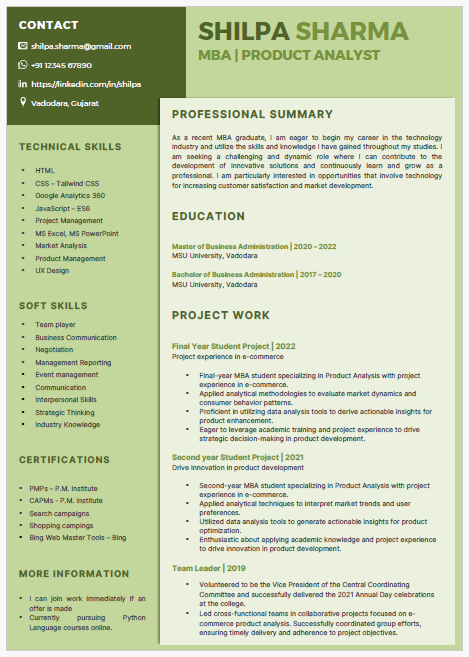Product Analyst
MBA

About this template
This is a very colorful and modern resume which can help you stand out from the competition.
Its vibrant design and well-organized layout effectively showcase your skills and achievements, making a lasting impression on potential employers.
Some important and useful technical skills for MBA, Product Analyst
For an MBA graduate pursuing a career as a Product Analyst, having a strong set of technical skills is crucial. These skills enable them to analyze market trends, understand customer needs, and make data-driven decisions. Here are ten important and useful technical skills:
1. Data Analysis and Visualization:
Proficiency in data analysis tools like Excel, SQL, and visualization tools such as Tableau or Power BI is essential. These skills help in extracting insights from data, creating reports, and presenting findings in a clear and compelling manner.
2. Statistical Analysis:
Understanding statistical concepts and techniques is vital for analyzing market trends, customer behavior, and product performance. Skills in hypothesis testing, regression analysis, and ANOVA are particularly useful.
3. SQL and Database Management:
Knowledge of SQL is crucial for querying databases, extracting data, and managing large datasets. This skill allows Product Analysts to efficiently access and manipulate data for analysis and reporting.
4. Market Research and Competitive Analysis:
Conducting market research and competitive analysis requires skills in data gathering, survey design, and competitor benchmarking. This helps in understanding market dynamics, identifying opportunities, and positioning products effectively.
5. Customer Segmentation:
Expertise in customer segmentation techniques, including clustering and profiling, is important for identifying target customer groups. This enables tailored marketing strategies and personalized product offerings.
6. A/B Testing and Experimentation:
Skills in designing and conducting A/B tests are crucial for assessing the impact of product changes or new features. This involves statistical testing, data interpretation, and decision-making based on test results.
7. Product Management Tools:
Familiarity with product management tools like Jira, Trello, or Asana helps in planning, tracking, and managing product development processes. These tools are essential for coordinating with cross-functional teams and ensuring timely delivery.
8. Financial Analysis and Modeling:
Understanding financial metrics and modeling is important for evaluating the economic feasibility of product initiatives. Skills in cost-benefit analysis, ROI calculations, and budgeting are key for making informed business decisions.
9. Programming Skills (Python/R):
Basic programming skills in languages like Python or R are valuable for automating data analysis tasks, performing complex statistical analyses, and building predictive models.
10. UX/UI Design Understanding:
A basic understanding of UX/UI design principles helps Product Analysts collaborate effectively with design teams. This skill is crucial for improving user experience and ensuring that products meet customer needs and expectations.
Conclusion:
These technical skills equip an MBA Product Analyst with the tools necessary to analyze data, understand market trends, and drive product strategies that align with business goals. They provide a strong foundation for making data-driven decisions and delivering successful products.